| Badman | |
|---|---|
 | |
| Studio album by | |
| Released | November 1988 |
| Length | 36:17 |
| Label | Parlophone |
| Producer |
|
Badman is the debut solo studio album from Scottish singer-songwriter Richard Jobson, released by Parlophone in November 1988.
| Badman | |
|---|---|
 | |
| Studio album by | |
| Released | November 1988 |
| Length | 36:17 |
| Label | Parlophone |
| Producer |
|
Badman is the debut solo studio album from Scottish singer-songwriter Richard Jobson, released by Parlophone in November 1988.
The majority of the tracks on Badman originated as recordings made by the Armoury Show, featuring Richard Jobson (vocals) and Russell Webb (bass) as its two key members. After a period of inactivity following the Armoury Show's 1985 debut album Waiting for the Floods and a tour to promote it, the two remaining band members Jobson and Webb reunited as a duo and began working on new material from late 1986 under the Armoury Show name, including the tracks "Love in Anger", "New York City", "Fire" and "A Boat Called Pride". With their original contract with EMI America coming to an end, they signed a new deal with the UK division of EMI's Parlophone and, to replace their former bandmates, subsequently recruited guitarist Dave Lockwood and drummer Ray Weston in early 1987. Two singles were during that year: "Love in Anger" in January 1987 and "New York City" in April 1987. [1]
The album Monkey Cry was recorded between 1986 and 1987, with Ian Broudie and Howard Gray involved in its production. It was originally due to be released in May 1987 and was to include nine tracks: "When Monkey's Cry", "A Boat Called Pride", "Love in Anger", "New York City", "This Thing Called Love", "Fire", "The Heat Is On", "The River" and another unnamed track. [1] The album's release was subsequently postponed to late 1987 and was to follow a new single scheduled for release in October 1987. These plans were postponed once again to avoid the Christmas period, with the single due in January 1988 and the album in February 1988. [2]
In January 1988, it was announced that the Armoury Show had disbanded, but with both Jobson and Webb remaining signed to EMI as solo artists. By this time, the decision had been made to rework Monkey Cry as a Jobson solo album under the working title A Boat Called Pride. A single was originally scheduled for release in March 1988, with the album to follow in April 1988, but this was eventually postponed to August and November 1988 respectively. [3] Five of the tracks intended for Monkey Cry appeared on Badman. The singles "Love in Anger" and "New York City" were not included, although "Uptown/Downtown", which originally appeared on the 12-inch format of "Love in Anger", is a reworking of "Love in Anger" and features the same backing track but with different lyrics, including quotes by German-American poet and writer Charles Bukowski. [4]
The title track was released as the album's only single on 30 August 1988. [5] The song was inspired by Edinburgh and, as revealed by Jobson to Music Week in 1988, about how "the American fleet came in after manoeuvres on the north coast of Scotland, and six months later there was an epidemic of heroin, followed by AIDS". [6] It failed to reach the top 100 of the UK Singles Chart, but did peak at number 20 on Music Week's 'The Other Chart' on 17 September 1988. [7]
| Review scores | |
|---|---|
| Source | Rating |
| NME | 4/10 [8] |
| Record Mirror | |
Upon its release, reviews were largely negative. Pete Paisley of Record Mirror called the album "shameless grade A rubbish" and wrote, "Way back when, Jobbo and his mate Stuart Adamson were in a sparky little combo called the Skids – happy days when the man's aesthetic athleticism was given full reign. Now our Dick has Side One of his newie sounding like bum Heaven 17 and Side Two like bum Big Country." [9] Dave Jennings of Melody Maker felt Badman "represents a failed attempt to create something huge and expansive" and instead "lack[s] fresh ideas and anything much to say". He noted that the material was Jobson's "most dance-oriented" and, while he "bellows boldly and proudly throughout", the lyrics are "most often nothing to be proud of". He considered the production to be the "most consistently admirable component", describing it as "generally glossy but nevertheless capable of springing surprises". [10]
John Tague of NME considered it "underwhelming, bland, late '80s studio gloss" that "could have been made by any one of 100 artists", with a "patchwork of producers and musicians lacking personality and any sense of individuality". [8] Marcus Hodge of the Cambridge Evening News felt the "watery, directionless album doesn't bode well for a full-blown musical career". He continued, "He is at best remembering his days in the Skids with tracks like 'A Boat Called Pride'. The slower ones only highlight his very ordinary voice and lyrics that belong to a television personality, not an alleged poet." [11] North Wales Weekly News noted that, although it was a "polished and professional effort", "you can't help feeling irritated that, after the two long years it took to complete, the result could have been slightly more memorable". [12]
All tracks are written by Richard Jobson and Russell Webb except where noted.
| No. | Title | Writer(s) | Length |
|---|---|---|---|
| 1. | "Badman" | Jobson, Adam Moseley | 3:48 |
| 2. | "This Thing Called Love" | 3:43 | |
| 3. | "Monkey's Cry" | 3:20 | |
| 4. | "Uptown/Downtown" | 6:32 | |
| 5. | "A Boat Called Pride" | 4:28 | |
| 6. | "Angel" | Ben Watt, Tracey Thorn | 4:43 |
| 7. | "The Heat Is On" | Jobson, Webb, Ray Weston | 4:59 |
| 8. | "Fire" | 4:44 |
| No. | Title | Writer(s) | Length |
|---|---|---|---|
| 9. | "Big Fat City" | Jobson, Billy Currie | 5:32 |
Production
Other
Richard Jobson is a Scottish filmmaker who also works as a television presenter. He is also known as the singer-songwriter of the band Skids.

The Circus is the second studio album by the English synth-pop duo Erasure, released on 30 March 1987 by Mute Records in Germany and the United Kingdom and on 7 July 1987 by Sire Records in the United States. It was Erasure's second consecutive album to be produced by Flood.

Standing on a Beach is a greatest hits album by English rock band the Cure, released in the United States on 15 May 1986 by Elektra Records and in the United Kingdom on 19 May 1986 by Fiction Records, marking a decade since the band's founding in 1976. The album's titles are both taken from the opening lyrics of the Cure's debut single, "Killing an Arab".
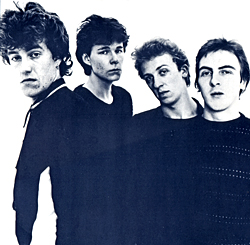
Skids are a Scottish punk rock and new wave band, formed in Dunfermline in 1977 by Stuart Adamson, William Simpson, Thomas Kellichan (drums) and Richard Jobson. Their biggest successes were the 1979 single "Into the Valley" and the 1980 album The Absolute Game. In 2016, the band announced a 40th-anniversary tour of the UK with their original singer Richard Jobson.

The Absolute Game is the third studio album by Scottish punk rock and new wave band Skids. Recorded in 1980 and produced by Mick Glossop, it was released in September 1980 by record label Virgin. It became their most commercially successful album, reaching No. 9 in the UK Albums Chart.

The UK singles chart is compiled by the Official Charts Company (OCC), on behalf of the British record industry, listing the top-selling singles in the United Kingdom, based upon physical sales, paid-for downloads and streaming. The Official Chart, broadcast on BBC Radio 1 and formerly MTV, is the UK music industry's recognised official measure of singles and albums popularity because it is the most comprehensive research panel of its kind, today surveying over 15,000 retailers and digital services daily, capturing 99.9% of all singles consumed in Britain across the week, and over 98% of albums. To be eligible for the chart, a single is currently defined by the OCC as either a "single bundle" having no more than four tracks and not lasting longer than 25 minutes or one digital audio track not longer than 15 minutes with a minimum sale price of 40 pence. The rules have changed many times as technology has developed, with digital downloads being incorporated in 2005 and streaming in July 2014.
The Armoury Show were a British new wave band, formed in 1983 and consisting of Richard Jobson on vocals, Russell Webb on bass guitar, John McGeoch on guitar and John Doyle on drums.

Greatest Hits is a compilation album by the English synth-pop band The Human League, released on 31 October 1988 by Virgin Records. It contains 13 singles released by the band, spanning from their debut single to their most recent album at the time, as well as lead singer Philip Oakey's collaboration with Giorgio Moroder, "Together in Electric Dreams" (1984). The album reached No. 3 in the UK.
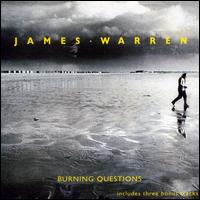
Burning Questions is the debut solo studio album by English singer and composer James Warren,. It was released on Sonet Records on 2 February 1987.

Waiting for the Floods is the first and only studio album by British new wave band The Armoury Show. It was released in September 1985 and entered the UK Albums chart at number 57 that month.

"Boys (Summertime Love)" is a song by Italian singer Sabrina, released in May 1987 as the third single from her self-titled debut studio album (1987). The song topped the charts in France (where it became the first number-one single by an Italian singer since 1984) and Switzerland, while peaking within the top five in Austria, Belgium, Finland, West Germany, Ireland, the Netherlands, Norway, Spain, and Sweden.
Russell Webb is a Scottish new wave bass guitarist who was member of bands such as Slik, PVC2, Zones, Skids, The Armoury Show and Public Image Ltd and collaborated with Richard Jobson, Virginia Astley and The Who.

John Doyle is an English drummer, who was a member of new wave bands like Magazine and The Armoury Show. He reunited with Magazine for a tour in February 2009.
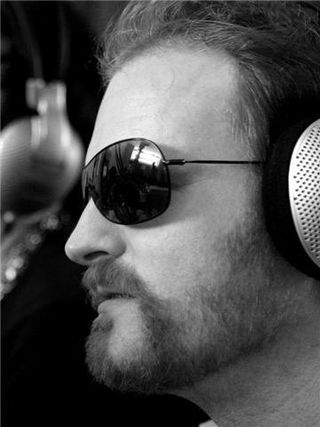
Howard Gray is an English musician, sound engineer, programmer, composer, re-mixer and producer who has worked with Public Image Ltd, Orchestral Manoeuvres in the Dark, Kirsty MacColl, the Armoury Show, the Pale Fountains, Japan, the Stranglers, Simple Minds, the Pretenders, XTC, UB40, Scritti Politti, Cherubs, Terence Trent D'Arby, Jean Michel Jarre, the Cure, Manic Street Preachers, U2, Puff Daddy & Jimmy Page, Tom Jones and Van Morrison.
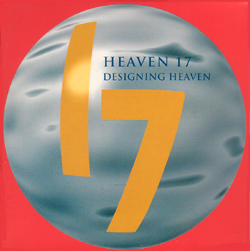
"Designing Heaven" is a song by the British new wave and synth-pop band Heaven 17, released in 1996 as the lead single from their sixth studio album, Bigger Than America. It was written by band members Glenn Gregory, Ian Craig Marsh and Martyn Ware, and was produced by Marsh and Ware under their production company British Electric Foundation. The song peaked at number 128 in the UK Singles Chart. It was the band's first release of new material since 1988.

"Love in Anger" is a song by British new wave band The Armoury Show, released by Parlophone on 5 January 1987 as the lead single from the band's unreleased second and final studio album, Monkey Cry. The song was written by the Armoury Show and was produced by Howard Gray. "Love in Anger" peaked at number 63 in the UK Singles Chart.
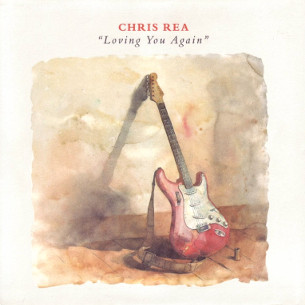
"Loving You Again" is a song by British singer-songwriter Chris Rea, released on 17 August 1987 as the second single from his ninth studio album, Dancing with Strangers. The song was written and produced by Rea. "Loving You Again" reached No. 47 in the UK Singles Chart and remained in the Top 100 for four weeks.

"The Loser Gets to Win" is a song by English singer Kiki Dee, released on 14 October 1983 by EMI as a non-album single. The song was written by Dee, Harry Bogdanovs and Gary Osborne, and produced Elton John and Osborne.

Me and My Mouth is the debut solo studio album by English singer Robert Lloyd, released by Virgin on 4 June 1990.

"Nothing Matters" is a song by English band Robert Lloyd and the New Four Seasons. Written by Lloyd, Mark Tibenham and Dave Lowe, and produced by Tibenham, the song was originally released as a single on 17 October 1988 on the In Tape label and peaked at number 13 in the UK Independent Singles Chart. The song was re-recorded for Lloyd's debut solo album Me and My Mouth, released by Virgin in 1990, with Andy Richards as producer. The new version was released as the second and final single from the album on 23 April 1990.